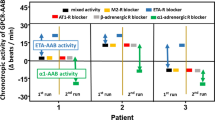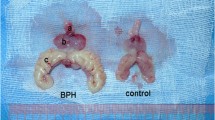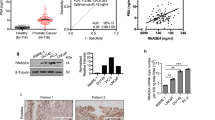Abstract
Purpose
In mouse models of prostate cancer, increased epinephrine levels accelerated tumor growth via the beta2-adrenoreceptor/PKA signaling pathway. It is unknown, however, whether men experience increased epinephrine levels sufficient to activate the beta2-adrenoreceptor/PKA pathway in the prostate gland. We measured epinephrine levels in blood samples collected immediately prior to prostate biopsies and measured phosphorylation of S133CREB (PKA site), S112BAD, T202/Y204ERK, and S473 Akt in prostate biopsy tissue samples.
Methods
Tissue samples and 3 ml of blood were obtained from men (n = 20) recruited from the patients scheduled for prostate biopsies. Epinephrine levels were measured by ELISA. Proteins were extracted from biopsied tissue, and protein phosphorylation was measured by Western blotting with phospho-specific antibodies. Pearson and Spearman’s rank correlations were analyzed to assess relationships between blood epinephrine levels and phosphorylation of CREB, BAD, AKT, and ERK.
Results
Epinephrine levels above 1 nM were detected in 5 of 20 patients. A strong positive correlation was observed between increased epinephrine levels and CREB phosphorylation. In contrast, no correlation was observed between epinephrine levels and phosphorylation of ERK, BAD, or AKT.
Conclusion
Our results suggest that increased blood epinephrine levels activate the beta2-adrenoreceptor/PKA signaling pathway in human prostate glands. These results will inform future studies to examine whether beta2-selective blockers can inhibit activation of the epinephrine/ADRB2/PKA pathway in prostate tumors of men with increased epinephrine levels and explore the use of beta2-selective blockers as adjuvant therapy for prostate cancer.

Similar content being viewed by others
References
Spiegel D, Giese-Davis J (2003) Depression and cancer: mechanisms and disease progression. Biol Psychiatry 54:269–282
Armaiz-Pena GN, Lutgendorf SK, Cole SW, Sood AK (2009) Neuroendocrine modulation of cancer progression. Brain Behav Immun 23:10–15
Traeger L, Penedo FJ, Gonzalez JS, Dahn JR, Lechner SC, Schneiderman N, Antoni MH (2009) Illness perceptions and emotional well-being in men treated for localized prostate cancer. J Psychosom Res 67:389–397
Nielsen NR, Kristensen TS, Zhang ZF, Strandberg-Larsen K, Schnohr P, Gronbaek M (2007) Sociodemographic status, stress, and risk of prostate cancer. A prospective cohort study. Ann Epidemiol 17:498–502
Metcalfe C, Davey SG, Macleod J, Hart C (2007) The role of self-reported stress in the development of breast cancer and prostate cancer: a prospective cohort study of employed males and females with 30 years of follow-up. Eur J Cancer 43:1060–1065
Dale W, Bilir P, Han M, Meltzer D (2005) The role of anxiety in prostate carcinoma: a structured review of the literature. Cancer 104:467–478
Hassan S, Karpova Y, Baiz D, Yancey D, Pullikuth A, Flores A, Register T, Cline JM, D’Agostino R Jr, Danial N, Datta SR, Kulik G (2013) Behavioral stress accelerates prostate cancer development in mice. J Clin Invest 123:874–886
Palm D, Lang K, Niggemann B, Drell TL, Masur K, Zaenker KS, Entschladen F (2006) The norepinephrine-driven metastasis development of PC-3 human prostate cancer cells in BALB/c nude mice is inhibited by beta-blockers. Int J Cancer 118:2744–2749
Perron L, Bairati I, Harel F, Meyer F (2004) Antihypertensive drug use and the risk of prostate cancer (Canada). Cancer Causes Control 15:535–541
Friedman GD, Udaltsova N, Habel LA (2011) Norepinephrine antagonists and cancer risk. Int J Cancer 128:737–738
Shah SM, Carey IM, Owen CG, Harris T, Dewilde S, Cook DG (2011) Does beta-adrenoceptor blocker therapy improve cancer survival? Findings from a population-based retrospective cohort study. Br J Clin Pharmacol 72:157–161
Grytli HH, Fagerland MW, Fossa SD, Tasken KA, Haheim LL (2013) Use of beta-blockers is associated with prostate cancer-specific survival in prostate cancer patients on androgen deprivation therapy. Prostate 73:250–260
Armaiz-Pena GN, Allen JK, Cruz A, Stone RL, Nick AM, Lin YG, Han LY, Mangala LS, Villares GJ, Vivas-Mejia P, Rodriguez-Aguayo C, Nagaraja AS, Gharpure KM, Wu Z, English RD, Soman KV, Shazhad MM, Zigler M, Deavers MT, Zien A, Soldatos TG, Jackson DB, Wiktorowicz JE, Torres-Lugo M, Young T, De Geest K, Gallick GE, Bar-Eli M, Lopez-Berestein G, Cole SW, Lopez GE, Lutgendorf SK, Sood AK (2013) Src activation by beta-adrenoreceptors is a key switch for tumour metastasis. Nat Commun 4:1403
Shaywitz AJ, Greenberg ME (1999) CREB: a stimulus-induced transcription factor activated by a diverse array of extracellular signals. Annu Rev Biochem 68:821–861
Kasbohm EA, Guo R, Yowell CW, Bagchi G, Kelly P, Arora P, Casey PJ, Daaka Y (2005) Androgen receptor activation by G(s) signaling in prostate cancer cells. J Biol Chem 280:11583–11589
Sastry KS, Karpova Y, Prokopovich S, Smith AJ, Essau B, Gersappe A, Carson JP, Weber MJ, Register TC, Chen YQ, Penn RB, Kulik G (2007) Epinephrine protects cancer cells from apoptosis via activation of cAMP-dependent protein kinase and BAD phosphorylation. J Biol Chem 282:14094–14100
Sadar MD (1999) Androgen-independent induction of prostate-specific antigen gene expression via cross-talk between the androgen receptor and protein kinase A signal transduction pathways. J Biol Chem 274:7777–7783
Ullrich PM, Carson MR, Lutgendorf SK, Williams RD (2003) Cancer fear and mood disturbance after radical prostatectomy: consequences of biochemical evidence of recurrence. J Urol 169:1449–1452
Schatzl G, Reiter WJ, Thurridl T, Waldmuller J, Roden M, Soregi S, Madersbacher S (2000) Endocrine patterns in patients with benign and malignant prostatic diseases. Prostate 44:219–224
Lechin F, van der Dijs B, Vitelli-Florez G, Lechin-Baez S, Azocar J, Cabrera A, Lechin A, Jara H, Lechin M, Gomez F (1990) Psychoneuroendocrinological and immunological parameters in cancer patients: involvement of stress and depression. Psychoneuroendocrinology 15:435–451
Nagmani R, Pasco DS, Salas RD, Feller DR (2003) Evaluation of beta-adrenergic receptor subtypes in the human prostate cancer cell line-LNCaP. Biochem Pharmacol 65:1489–1494
Sastry KS, Smith AJ, Karpova Y, Datta SR, Kulik G (2006) Diverse antiapoptotic signaling pathways activated by vasoactive intestinal polypeptide, epidermal growth factor, and phosphatidylinositol 3-kinase in prostate cancer cells converge on BAD. J Biol Chem 281:20891–20901
Acknowledgments
The authors are grateful to Karen Klein for critical reading and for helpful suggestions; to Denise Young for helping with patients’ recruitment and sample handling; and to Megan J. Whelan, Lisa Dixon, and Claire Kimbrough for IRB protocol assistance. Project described was supported by Award Number R01CA118329 from the National Cancer Institute to George Kulik. The content is solely the responsibility of the authors and does not necessarily represent the official views of the National Cancer Institute or the National Institutes of Health.
Conflict of interest
Authors declare no conflict of interest that pertains to this publication.
Author information
Authors and Affiliations
Corresponding author
Rights and permissions
About this article
Cite this article
Hassan, S., Karpova, Y., Flores, A. et al. A pilot study of blood epinephrine levels and CREB phosphorylation in men undergoing prostate biopsies. Int Urol Nephrol 46, 505–510 (2014). https://doi.org/10.1007/s11255-013-0513-0
Received:
Accepted:
Published:
Issue Date:
DOI: https://doi.org/10.1007/s11255-013-0513-0




